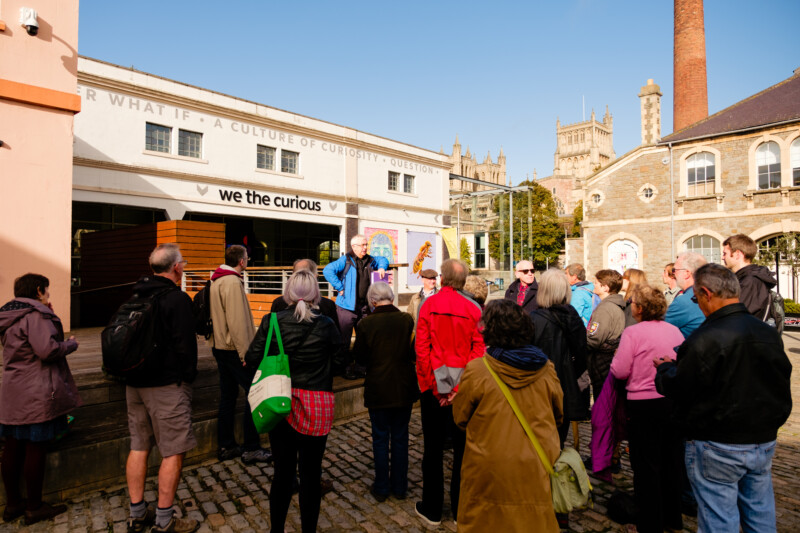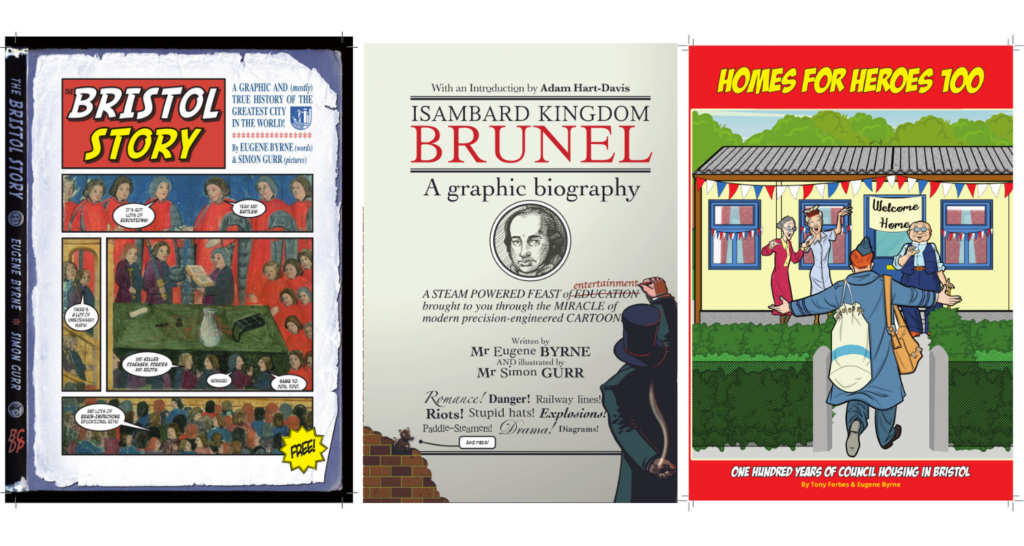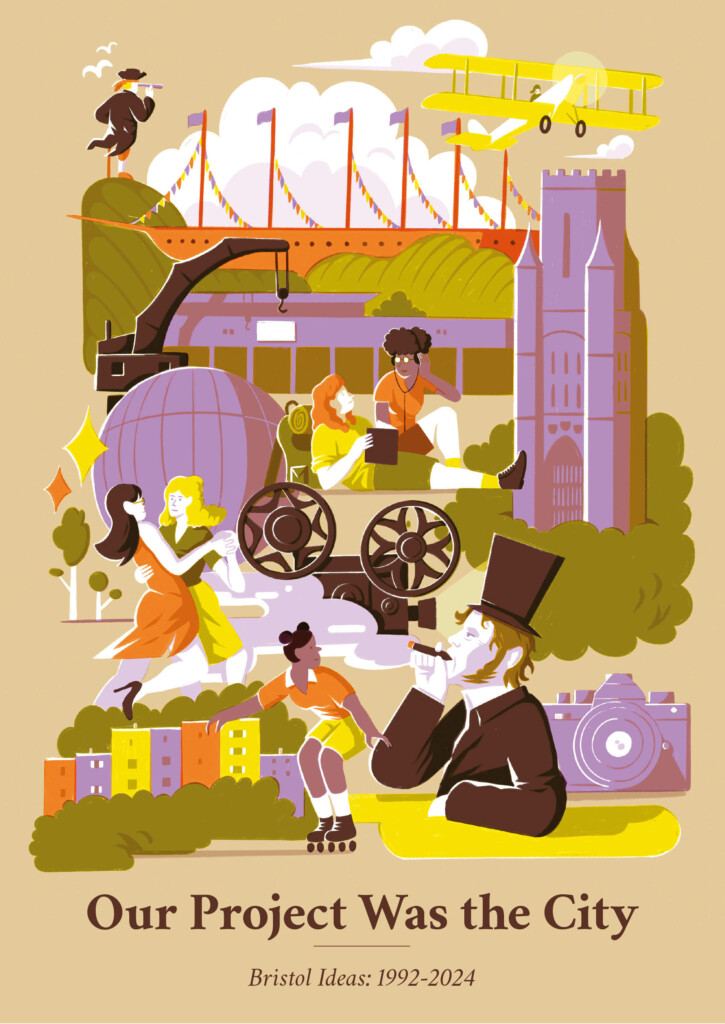Me and Bristol Ideas Eugene Byrne

Share this
Eugene Byrne leads a Festival of the Future City walk on Unbuilt Bristol in 2019. Walks about ideas and Bristol are an important part of the work of Bristol Ideas. Unbuilt Bristol – the only walk we did where there was nothing to see – joined many other walks in the series including Brunel’s Bristol, Romantic poetry, Bristol and the First World War and women’s Bristol. (Evan Dawson)
Bristol Ideas had a long relationship with Eugene Byrne, from his days on the much missed Venue magazine, through his creation of many books for our projects, to his unofficial role of Bristol historian to the Bristol Ideas team. With illustrator Simon Gurr, Byrne created graphic novel-type books on Brunel, Darwin and, in 2008, The Bristol Story. It remains, 16 years on, the most popular introduction to the history of Bristol. He writes here about some of these projects and the wider work of Bristol Ideas.
Remember the 1990s? It was when some pranksters, whose numbers included Toby Young and Bristol-born professional prole Julie Burchill, decided to do to ‘culcher’ what punk had done to music and published a magazine called the Modern Review.
(It says here – I had to look this up on Wikipedia as I never read the thing – that ‘it aimed to give equal cultural weight to Roland Barthes and Bart Simpson’, ie your classic postmodern we-mean-it-but-we-don’t-mean-it bollocks.)
The same people who pretended to read the Modern Review often dropped a word that got debased through over-use: zeitgeist – literally ‘time spirit’. The same users discovered ‘schadenfreude’ around the same time, which they used correctly, and ‘realpolitik’, which they usually did not. They didn’t bother with ‘weltanschauung’ as it looked too hard to pronounce.
Zeitgeist, though, is a useful word. It sounds more serious and precise than ‘the spirit of the age’, and for 30 years Bristol Cultural Development Partnership/ Bristol Ideas (BCDP/BI) reflected Bristol’s zeitgeist. It ‘surfed the zeitgeist’, as we pseuds used to say, but only if we could be sure everyone realised we were saying it ‘ironically’.
Surfed how? OK, horrible generalisation, but here goes …
Bristol Ideas was founded in the early 1990s with hard-headed, clear-eyed purpose to promote local culture in all its forms, up to and definitely including STEM (Science, Technology, Engineering and Mathematics), as a means of boosting local prosperity and improving the quality of life. This was the 1990s/2000s.
In its middle years, Bristol Ideas focussed a great deal of its work on amusing and entertaining things, aiming to bring people from all walks of life together and show the world what a fun place Bristol was. (There are probably still some people who think Banksy is the defining Bristolian artist of the era. He’s not. It’s Luke Jerram.)
Bristol isn’t nearly as much fun nowadays, and that’s not entirely down to the pandemic and/or the state of the economy. The children born since BCDP/BI was set up are now weighed down by all the existential threats to the human race. I’m sure I don’t smell as much weed as I used to when walking through town. In more recent times, BCDP became ‘Bristol Ideas’, something more cerebral, high-minded and serious, with discussions about economics, a Festival of the Future City and earnest events looking at life and death issues.
(Like I said, a horrible generalisation.)
Wider Bristol went the same way; for those who aren’t too busy worrying about how to pay for a roof over their heads and feed their children, anyway.
You might also argue that BCDP/BI paralleled the wider city management in that its early years were about grand strategy. Sort out Harbourside, make space for new businesses and industries to replace the manufacturing base that Thatcher destroyed, make Bristol fit for tourists, make a big noise about the history and heritage, including the bad stuff.
And, yeah, bid to be European Capital of Culture, because, actually, why the hell not?
More latterly, what with the economic crisis, the continuing fallout from Covid 19 and the hollowing-out of local authorities and public services by central government, everything feels more fragmentary and lacking leadership and direction. There’s lots of talk but taking action seems too difficult. We feel powerless and we are bitterly divided over many issues.
But at its best, BCDP/BI could bring everyone together for things that made us all feel like Bristolians, not just people who happened to live there.
We all thought the Centre for the Performing Arts, aka The Harbourside Centre, was a great idea. Everyone liked the 200th celebrations of Brunel’s birthday.
You can argue about BCDP/BI’s achievements, but for my money one of its most inspired moves was to celebrate the centenary of aviation in Bristol. Aerospace was something a lot of middle-class blow-ins with humanities degrees didn’t get and never paid any attention to. But it’s been paying a lot of the city’s bills since 1910.
Likewise, the project on council housing in 2019 reached deep into the real Bristol. It created a fantastic buzz in many places; in Sea Mills, for instance, it gave us a community museum in a phone box.
BCDP/BI gave me some wonderful opportunities. I worked with two brilliant artists on some comics, including a graphic novel-style history of Bristol which ran to 85,000 copies which were given away free.
This alone provided a couple of priceless moments; my children’s schoolmates liked it, so my kids respected me for a day, which was nice. I also heard from a woman in her mid-40s who was very dyslexic and said it was the first book she had ever managed to read from cover to cover as an adult. Try and imagine how wonderful it felt to hear that. Especially since I’d put so many words in that purists protested that it wasn’t a ‘proper’ comic at all.
I’m grateful to Bristol Ideas for many other things, particularly the numerous opportunities to pontificate in person, in print and online about Bristol past and present.
In more than 30 years, there were bound to be some big disappointments: the Arts Council pulling the plug on The Harbourside Centre and our failure to win European Capital of Culture status.
I had might-have-beens of my own. Bristol Ideas commissioned artist Simon Gurr and me to do a biography in comic form of Charles Darwin. My agent was all set up to do us a mortgage-paying-off-money deal for the global rights, but then the world economy went pear-shaped. Still, spilt milk, eh? But it has been re-published in American, Spanish, Portuguese and Korean (South, obvs) editions, which is pretty cool.

But that’s just me. In its time, BCDP/BI launched and supported no end of creative careers. It brought artists and writers of every kind together for some wonderful collaborations which would not have happened otherwise. The shame of BCDP/BI folding is that actually we need that earlier strategic thinking about culture more than ever right now. Sure, we also need schools, hospitals, affordable housing, public transport, living wages, sustainable growth etc, etc, etc…
But it was never either/or. We need it all. And culture in the broadest sense – not just plays, art galleries and orchestral concerts, but cinemas, pubs, clubs, books and magazines – adds to a community’s prosperity and wellbeing.
The history, the entertainment and arts, the tales we tell, the way we tell them, the way we think, the things we argue about… these are all part of who we are. They’re what makes a place somewhere and not just anywhere, and that’s what BCDP/BI did. We’d have had a lot less zeitgeist without it.
Eugene Byrne is a Bristol-based author, historian and journalist. He has written several books on Bristol’s history, including The Bristol Story (with artist Simon Gurr) and a brief history of council housing in Bristol (with artist Anthony Forbes). He edits the Bristol Post’s ‘Bristol Times’ local history pull-out.

This essay is taken from Our Project Was the City: Bristol Ideas 1992-2024, published May 2024.